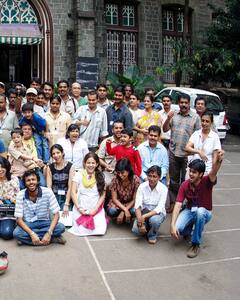Amid All The RRR Praise, Some Scathing UK Reviews: ‘Lies’, ‘Travesty Of History’, ‘Nasty’. Netizens React
Writing for The Spectator, Cambridge historian Robert Tombs said: 'RRR panders to the reactionary and violent Hindu nationalism’.

Four months since its theatrical release, filmmaker SS Rajamouli's blockbuster RRR has been continuing to garner praise. While the film has already achieved a cult status in India, lavish praise has been coming from international audiences too. The latest to shower applause on the Ram Charan-NT Rama Rao Junior flick is filmmaker Joe Russo, whose The Gray Man starring another South star Dhanush just released on Netflix. He called it a “well done epic”. Before Russo, there were other Marvel Cinematic Universe alums James Gunn, Guardians of the Galaxy director James Gunn and Doctor Strange director Scott Derrickson, who had tweeted in praise of the massive hit.
RRR has become the first film from India to be nominated for Best Picture category at the Hollywood Critics Association Awards. And there are talks that it may even be sent to the Oscars as India’s official entry.
However, amid all the praise, there is a section overseas that has heavily criticised the film, mainly because of its plotline and the way the British employees in colonial India were portrayed in it.
After a July 9 report in Daily Mail quoted a historian as saying that what is shown in the movie is “a very dangerous concoction of lies”, a Cambridge professor wrote in The Spectator last week called the portrayal of certain characters "unusually nasty and at the same time amazingly silly”.
The RRR Story
RRR (Rise, Roar Revolt) is a story of two legendary revolutionaries and their fight for India in the 1920s. It’s a fictional depiction of the lives of real-life freedom fighters Komaram Bheem and Alluri Seetharama Raju. While Ram Charan plays Raju, Jr NTR portrays the role of Bheem.
The story of the film begins with Governor Scott Buxton and his wife Catherine ‘buying’ a young tribal girl against her parents’ wishes after visiting a forest area inhabited by the Gond tribe. Komaram Bheem, who is the tribe’s guardian, then travels all the way to Delhi to rescue the girl. Raju, meanwhile, serves in the Indian Imperial Police with the ultimate aim to bring down the British. While his job was to protect the Governor from Bheem, he joins him. The film showed their journey and how they together rose, roared and revolted against the British and even succeeded in the mission.
RRR also had Alia Bhatt and Ajay Devgn playing cameo roles. According to IMDb, the film loaded with VFX was made at a budget of Rs 550 crore — the most expensive film to have been made in India so far.
It has earned over Rs 1,200 crore across the world, according to boxofficeindia.com.
‘RRR Panders To The Reactionary And Violent Hindu Nationalism’
The film showed unbearable atrocities on Indians by the British, as has been depicted in all real and fictional stories of India’s struggle and uprising against the British Raj in the past.
Robert Tombs, emeritus professor in history at the University of Cambridge, however, told Daily Mail: “This film is a piece of xenophobic slander, utterly false and without historical foundation.”
He later wrote a scathing review in The Spectator. “To portray British officials and soldiers roaming the country casually committing crimes is a sign of absolute ignorance or of deliberate dishonesty.”
To buttress his argument, Tombs added: “The Indian civil service – the highest ranks of the administration – were regarded as an incorruptible elite, highly selected and dedicated to their jobs. In any case, in the 1920s, many of them were Indians: in 1929, there were only 894 British officials in the ICS.”
This, he said, meant “Indian colleagues and indeed Indian superiors sitting back and allowing rogue Brits to commit murder”.
Tombs also said while the British usually “shrug this off”, similar movies “would be regarded as crudely racist” if they slandered other nations like this.
“Imagine a film showing twentieth-century Nigerian rulers as cannibals, or Hindu politicians burning widows alive. But we can’t imagine such films, because they would not be made,” he wrote.
Robert Tombs acknowledged why the British are shown in movies in such a negative light. “We have played such an important role in the world over the last few centuries that we have accumulated enemies as well as friends. In many nationalist myths, we are cast in the role of villains. It’s a way that quite a few countries make up heroic stories about themselves.”
But, he added, that is no reason why the British should “accept these stories as true, or start apologising for things that did not happen”.
Tombs also wrote that there were indeed some regretful events that India saw during the British rule, such as the 1919 Jallianwala Bagh massacre in Amritsar, but the British government had acknowledged such events.
“I mention this because hardly any British person who has been to India — and I have been half a dozen times to as many different regions — can have experienced hostility arising from the memory of British rule,” he wrote. “I have stood on the spot where the massacre took place, with feelings readers might easily imagine. Some young Indian men came up to me. I was expecting at least a reproachful comment. But they just wanted to say hello and practise their English.”
Tombs wrote that India in the 1920s, when the RRR plot is set, “was mostly run by Indians, under fairly distant British supervision”.
He went on to say that films like RRR “try to stir up synthetic emotions”, and are “absurdly unbelievable”.
Tombs also sought to link the trend to the current nature of Indian politics. “RRR panders to the reactionary and violent Hindu nationalism that is coming to dominate Indian culture and politics…” he wrote, and added that it will be the Indian minorities and liberals who are suffering from this, and not the British.
He went on to say that RRR reflects “the growing nastiness of today’s India” and castigated Netflix for promoting the film.
What Others Are Saying Against RRR
Quoting critics, the July 9 article in Daily Mail said RRR “grossly mispresents history”, and twists some versions of events to present “fiction” as fact.
“The entire plot is a travesty of history,” Dr Zareer Masani, who is an expert on British colonialism, was quoted as saying. “It’s fiction presented as fact.”
He said there might have been acts of violence in the 19th century, but not in the 1920s, when the film is set.
While Netflix carries a disclaimer with the film stating that “the story is purely fictional”, Masani said it was not enough as the film “will be taken as gospel by many”, a concern Robert Tombs also shared in his review in The Spectator.
“RRR seems to combine sadism with anti-British racism and a good dollop of historical invention," the Daily Mail article quoted Cambridge historian Andrew Roberts as saying. "What you get is a very dangerous concoction of lies,” he added.
“Portraying employees of the colonial service as cartoon villains is par for the course nowadays," said Toby Young, founder of Free Speech Union. "In reality, they were almost all conscientious, highly scrupulous public servants.”
How Netizens Are Reacting To RRR Criticism
The British criticism of RRR has evidently, and unsurprisingly, not gone down well with Indians. Netizens have reacted to both the Daily Mail article and the review by Robert Tombs.
Check out some of the posts:
Robert Tombs is an absolute bigot as his racism is reflected in this article itself where he says ‘Indians came to him to practice their English’. This is why RRRs should be made, atrocities displayed and gruesomeness of Raj ought to be publicised. https://t.co/l8wd4UpYot
— Ajeet Bharti (@AjeetBhartii) July 20, 2022
BritishBabu is upset that his nostalgia is being disturbed & Indians are awakening to the truth. Colonialist administration oppressed India in many ways, denying it is a crime: #Colonized What Netflix's RRR gets wrong about the British Raj | The Spectator https://t.co/5owdkCUwQO
— Dr. Lavanya Vemsani Ph.D. (@ProfVemsani) July 19, 2022
“The vogue for facile anti-imperialism”, it seems. LOL. https://t.co/xtvR1pmbtE
— Aniruddha Guha (@AniGuha) July 20, 2022
This clown needs a history lesson badly. Not the British version. The world version. https://t.co/FLlBrYEOQI
— Rohit Ghali (@rohitghali) July 20, 2022
'A concoction of dangerous lies': Netflix slammed for film that depicts the 1920s British Raj as being 'addicted to rape and murder'
— Harpreet (@CestMoiz) July 12, 2022
Awwww .. Mirrors aren't very high in demand amongst descendants of the Empire, it seems, 'coz they show their true faces!https://t.co/kPNjxHfyGc
Trending News
Top Headlines






































